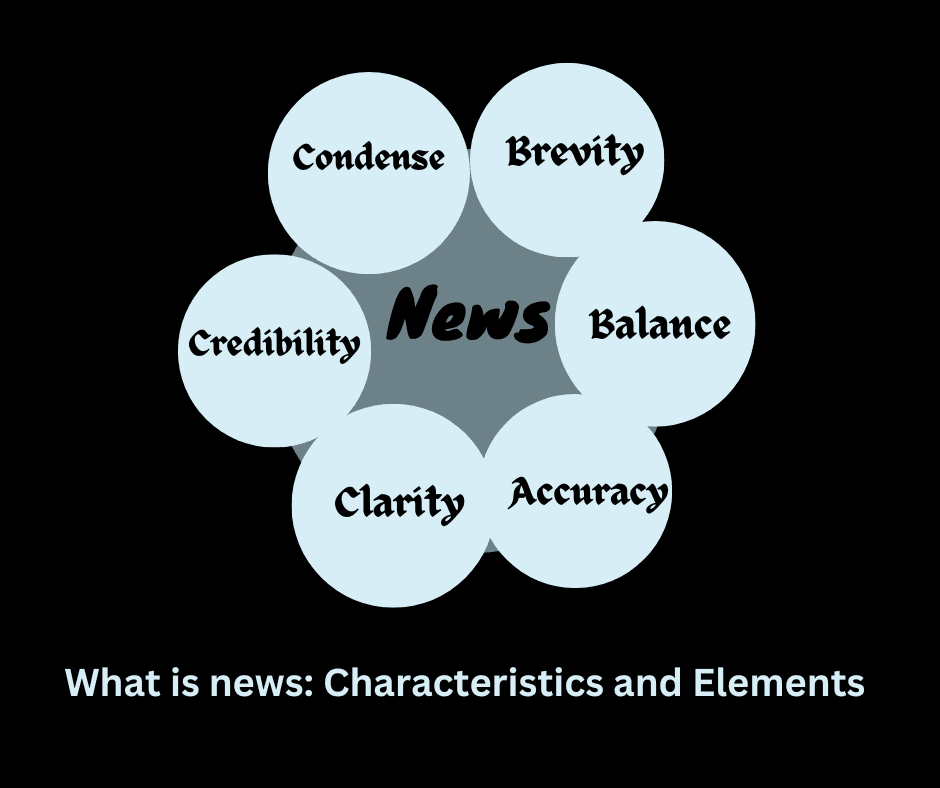When considered in terms of definition, news cannot be limited to any specific characteristics, criteria, or structure. Due to various limitations, it isn’t easy to define news universally. However, news must be people-centered, based on people’s needs and interests. In a word, the news describes some events that are new, exceptional, unusual, and attract the public, which is immediate or timely, public interest, social development, progressive, true, accurate, and financially based, tasteful, ethical, and legally published in the media.
Thousands of events are happening all over the world every moment, as a result of which news is a report of some special events selected according to specific criteria.
A skilled journalist can observe an event and say which is news and which is not news. To curb this innate tendency of people, a journalist goes out in search of news.
He uses his news sense to thoroughly scrutinize and select news that is of public interest, always new, exceptional, and interesting, and publishes or presents it to readers, viewers, and listeners.
Some characteristics of news:
Everything has some characteristics. News also has some characteristics. Below are the main six characteristics:
1. Accuracy
2. Balance
3. Brevity
4. Clarity
5. Credibility
6. Condense

1. Accuracy:
Basically, news will be based on accurate information, written in a proper framework, reliable, and properly presented documentary. It should be remembered that no journalist has the right to mislead the reader by telling false information or partial information as true.
2. Balance:
News will be seen from the neutral point of view of the reporter or correspondent and written without bias based on objective information with the language or statements of all parties concerned.
3. Conciseness:
News will always be a simple and concise report written on the basis of objective, true, and unadulterated information, free from all kinds of redundancy.
4. Clarity:
One of the main characteristics of news is clarity. This is very important in the case of news. Just as the news should not contain any ambiguity or incompleteness, it should also not contain any irrelevant or unnecessary information. That is, the news should be clear, neat, straightforward, and clean.
5. Credibility:
This is one of the most important issues in the career of journalists. Every reader wants to see the news as objective, reliable and credible. If any of these things happen in the message of a journalist, the reader has a negative impression of that journalist. It should be remembered that every reader, viewer and listener spends valuable time on the news and becomes aware of it. If it is faulty or baseless, then they lose trust, which is an irreparable loss for the media.
6. Summary:
The news will be the summary of any event. In the current busy era, the reader can get an idea about the entire event by reading the summary of the entire event written in short words or in small paragraphs.
Elements of News:
Every news item has some important and valuable elements. Usually, these elements help determine the importance and value of the news. It is the moral responsibility of a journalist to present news based on the needs of the public. Every journalist can easily verify the value of news by analyzing the elements of the news in this way. Some of such important elements are mentioned below –
1. Immediacy:
In the case of news, especially hard news, the characteristic of immediacy is essential. The characteristic of immediacy is a kind of absolute, extreme, or hot news. Again, in terms of immediacy, news is the most perishable information product in terms of immediacy in terms of news value. Therefore, for this reason, immediacy is considered the most powerful and essential element of news.
2. Proximity:
The event that is close to the person, especially the reader, attracts more attention. If a close or familiar person, a familiar object, place, or institution is involved in an event, whether it is positive or negative, the reader naturally feels more attracted to it and is interested in knowing about it. This is mainly because the reader’s level of interest in the news is sometimes less or more based on the proximity of the source of the news.
The level of interest or attraction of readers, viewers, and listeners towards news can be determined in two ways based on proximity:
- Geographic proximity: The closer the news source is in terms of spatial or geographical distance, the greater the reader’s interest in it. Any event happening in the outside world, especially in the country where it occurs, will not be as interesting to other countries as the people of that country would read or know about it with as much interest.
- Psychological proximity: Psychologically, whether news from near or far is important or not is irrelevant. Sometimes a distant event takes place on the pages of a newspaper as important or big news. Not only that, events that happened in the recent past, accidents, religious issues, etc. take place as important and big news for the indigenous people of other countries. Therefore, psychologically, the importance and attraction of news for all classes of readers can be more or less.
3. Quarrel or conflict:
Quarrel or conflict is an important element of news. Everyone watches the fight between a wife and mother-in-law with interest, but no one examines the respect and love between a wife and mother-in-law. Again, today is the last day for a certain company to submit a tender. This news will not get that much importance on the pages of the newspaper, but if it is said that today, when a certain company submitted a tender, the number of clashes between two groups was so… so… this news will definitely get importance on the pages of the newspaper.
4. Size:
The size or scope of the news is also an important factor. The importance of an event will be determined based on the events that are being reported. For example, in accident news, the number or quantitative level of damage is considered. On the other hand, the size of the news depends on the quantitative level of the people and resources involved in a development news.
5. Significance:
News media workers naturally write and present news by analyzing and evaluating the various dimensions of the event. It should be remembered that the impact, consequences and importance of all events are not equal. Some events have more impact on public life, some less. Some have a temporary impact, while others have a long-term impact. As a result, the news that has a widespread and profound impact on public life becomes more important, and the reader is interested in knowing about it.
6. Development and Progress:
This is an important element of news. For example, a special achievement, an achievement, someone’s success story, or a positive and desired change in an event related to public interest is always interesting and good news for all classes of readers. For example, during the Cricket World Cup, cricket is seen everywhere in the country, and the excitement of playing cricket is seen among all classes of people. In addition, the news and pictures of successful players on the pages of newspapers inspire many. Such news is undoubtedly important and positive.
7. Human appeal: The event that deeply moves people’s emotions, that matter is given more importance as news. Our emotional world consists of numerous elements, including laughter-crying, sadness-suffering, anger-disappointment, separation-passion, jealousy-hate, and love-sympathy. News rich in human appeal enlightens the common people more.
8. Mysterious news:
Any mysterious news attracts the reader more. The more mystery there is behind the incident, the more newsworthy the incident is. Mysterious news increases the importance of the news to the reader, and the reader is more interested in reading the news of mysterious incidents to solve the mystery.
9. Strange and novel:
Strange, novel, and unusual incidents are always evaluated as news, and these incidents get readability.
10. Crime:
In most cases, bad news, i.e., crime, corruption, or any negative news, is given more importance in the perception of journalists or news workers. For psychological reasons, the element called crime is considered very powerful news in the news. On the one hand, such news becomes visible to the public; on the other hand, the identity of the real criminals is revealed to society through this published news.
11. Innovation:
Various discoveries in science are constantly affecting our lives. Readers always want to know about any new invention or discovery story. With the help of the media, the world can know what is being done around the world, who is discovering where and by whom. These unknown stories increase the value of news, and the reader receives them with attention.
12. Anxiety:
The consequences of which make the readers or viewers-listeners anxious and certain. Those events attract the readers in the country as news. Any fire, accident, natural disaster, etc. news is broadcasted or published with great importance through every newspaper. This news attracts every reader like a magnet.
A news story aims to inform, educate, or entertain by delivering timely, accurate, and relevant information about events, people, or issues. Its effectiveness relies on clear communication, factual integrity, and the ability to engage the audience, ensuring that the core message resonates and provides value.



